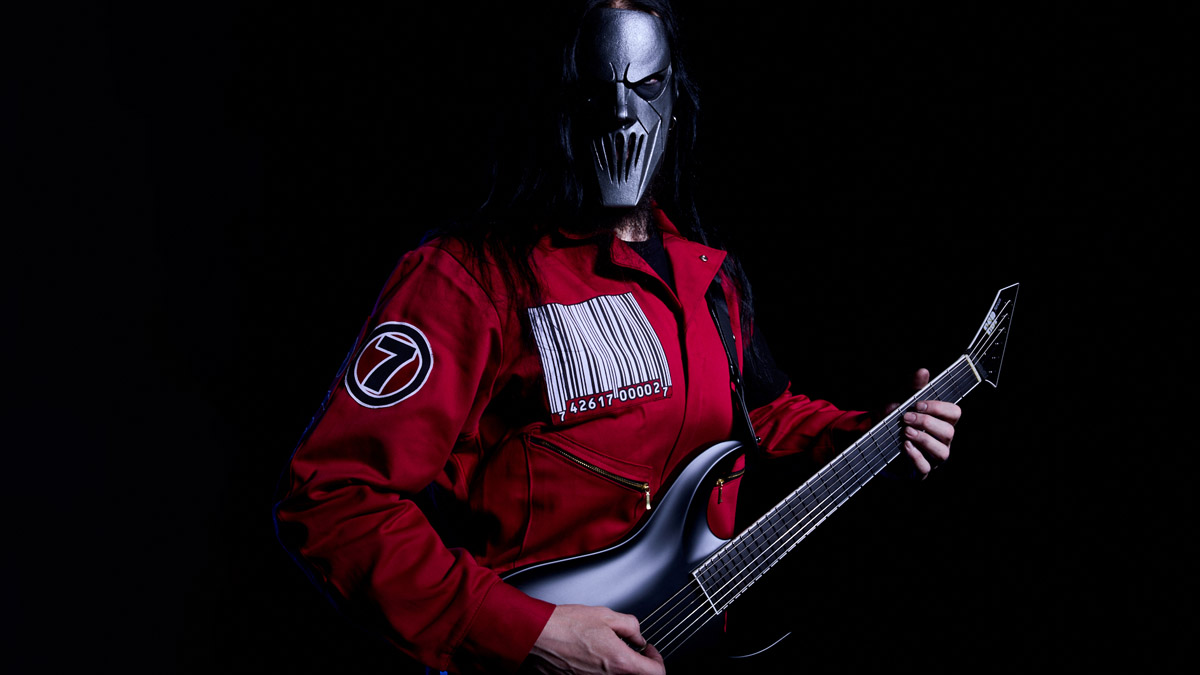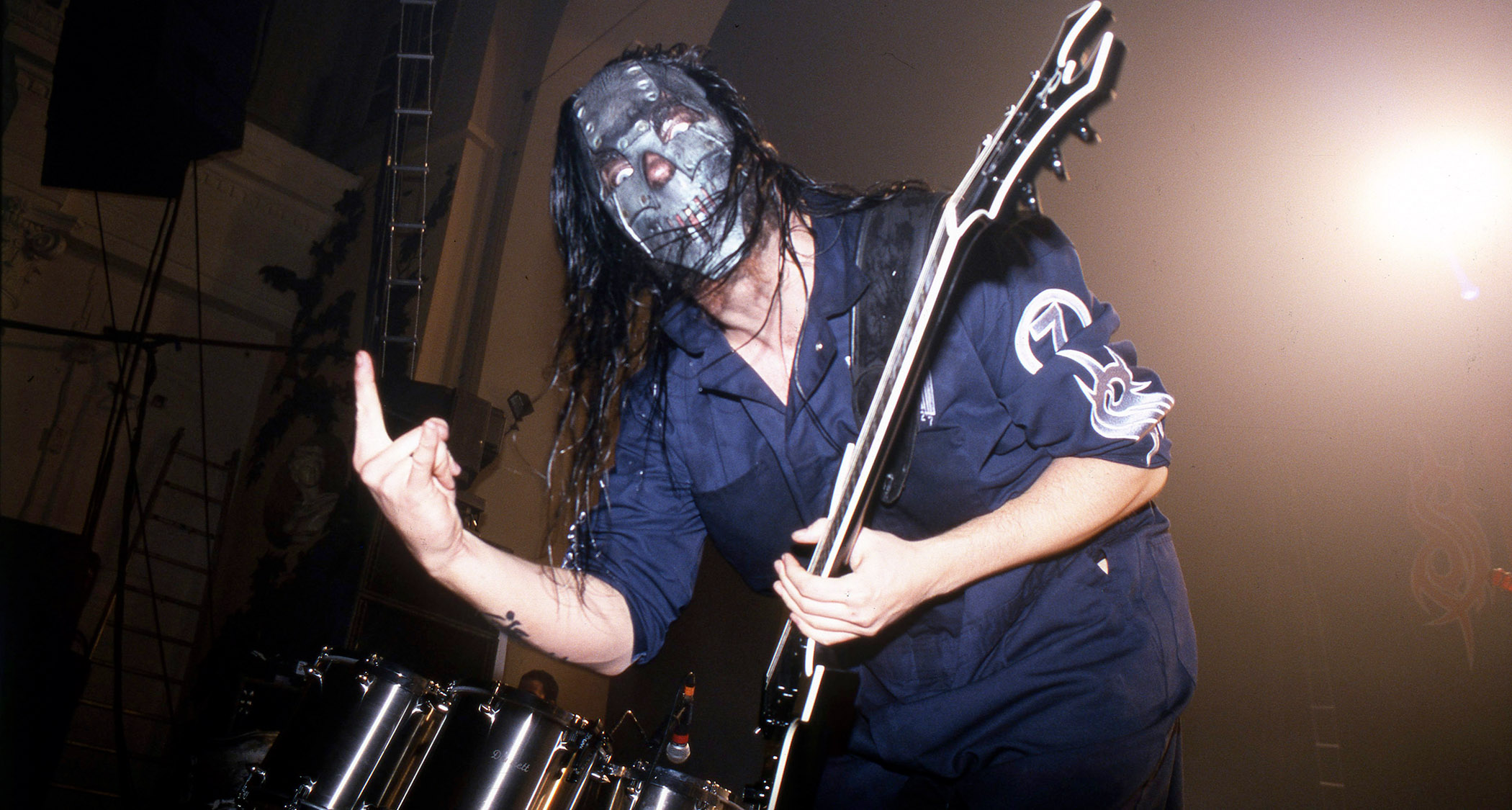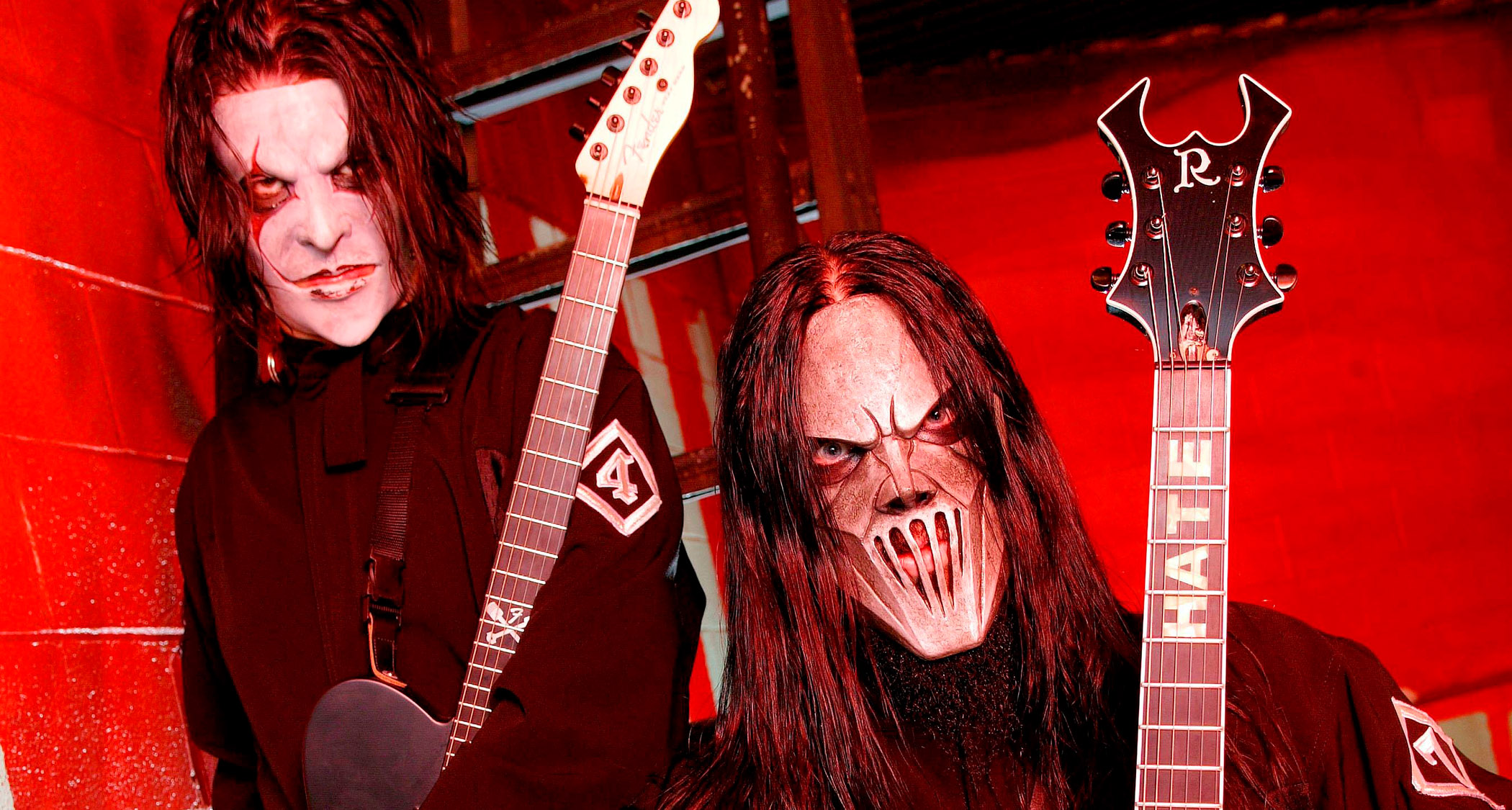
It was 25 years ago that Slipknot dropped their self-titled debut album on Roadrunner Records.
And if the idea of a band made up of nine masked men in red jumpsuits playing a highly combustible and chaotic strain of heavy metal – one that mashed together everything from thrash and death, to punk and hardcore, to hip-hop and sampled sounds, all of it laced with a healthy dose of atmospheric weirdness and straight-up ear-bleeding noise – would not only still be around a quarter-century later, but also be a multi-platinum, arena-dwelling, festival-headlining behemoth sounded, well, crazy? You wouldn’t be the only one to think so.
“Not a fucking chance,” says guitarist Mick Thomson when asked if he thought major success was in the cards for the band. “We were just a bunch of stupid idiot kids.”
Nevertheless, those kids – Thomson, singer Corey Taylor, percussionists Shawn “Clown” Crahan and Chris Fehn, drummer Joey Jordison, bassist Paul Gray, turntablist Sid Wilson, sampler/keyboardist Craig Jones and guitarist Josh Brainard – created something that didn’t just connect with a large audience, but also altered the very sound and look of heavy metal.
In 2024, Slipknot may not be exactly the same unit – the masks and jumpsuits are still there, but the only members remaining from their debut album are Thomson, Crahan and Taylor (as well as guitarist Jim Root, who joined late in the process for Slipknot and remains an integral part of the band). But over the course of 25 years and seven studio albums, including their most recent, 2022’s The End, So Far, they’ve built up one of the most impressive and influential catalogs in metal.
And it all began with Slipknot. Powered by two singles – the corrosive-yet-catchy Wait and Bleed and the rap-metal rager Spit It Out – as well as frantic and ferocious album anthems like (sic), Surfacing and No Life, the songs hit with laser-focused precision while also sounding as if they were on the verge of devolving into complete cacophony.
Credit this dichotomy at least in part to the presence of producer Ross Robinson, at the time celebrated for pulling raw, open-wound performances out of acts like Korn and Sepultura, who proved an ideal pairing for the band.
“Ross let us loose in the studio, and we went nuts,” Thomson says of the sessions at Indigo Ranch in Malibu, California. “He kept the intensity up. But, you know, he was just matching our level.”
People didn’t f**king know what to think or do with us early on. But our thing always was, ‘F**k your labels – just listen to the shit. Do you like it?’ You don’t have to categorize it and this and that. Just ask yourself, ‘Is it cool?’
For some, it was levels previously unheard. “People didn’t fucking know what to think or do with us early on,” Thomson says. “But our thing always was, ‘Fuck your labels – just listen to the shit. Do you like it?’ You don’t have to categorize it and this and that. Just ask yourself, ‘Is it cool?’”
Thomson recently sat down with Guitar World to discuss the making of Slipknot and offer his thoughts on the landmark record 25 years on. He also dove into the streamlined and somewhat surprising gear he used for the sessions, named his favorite song from the album and got honest about how he feels about the lack of guitar solos on the record. “I wasn’t super happy, but, you know, whatever,” he says.
At the end of the day, it all worked out. “Everything had to happen the way it did,” Thomson says. “It all had to be exactly that way. Because that’s what made the record, and that record is what made us.”
Let’s get the obvious question out of the way: does it feel like it’s been 25 years since Slipknot?
“I don’t know, because I don’t know what 25 years should feel like! [Laughs] It’s so weird, because a normal person’s passage of time is this sort of linear thing, but with us, we’ll be on the road, and then we’re off the road, and then we’re on the road, and then we’re off the road… It’s like I have these, like, two different lives that pause each other. So it seems like yesterday, but it seems like forever ago at the same time.”
We were extreme. And when we went into the studio we kept that extremeness
The Slipknot recording sessions at Indigo Ranch have taken on this mythology of having been really chaotic and intense. How would you describe them?
“I think the way I see it is, it’s not that it was so intense… it’s that it was just us being us. We’re intense, right? So it was us doing our thing. It’s not like a bunch of innocent people were sitting there and some extreme whatever was thrown at ’em. We were extreme. And when we went into the studio we kept that extremeness.
“Instead of just sitting in the studio and playing, we recorded like it was a show. So the intensity in the studio was that we were basically playing our asses off like we were playing a show. We were hitting hard. Joey’s not trying to play perfect on his drums – he’s bashing the shit out of them. Same with me.
“I was literally headbanging while tracking the record, to get the vibe, instead of sitting there like a machine. And I think that translated to a lot of seat-of-your-pants, on-the-edge kinda shit.”
Was Ross Robinson someone you really wanted to work with as a producer?
“It was a dream for us. But also, he wanted to work with us. So it was very mutual. You know, I wasn’t into the stuff he did before, but I appreciated him and his work and his sounds. So it was great to get to work with him. And I’m a totally different person, totally different player, just for having known him.
“It really changed a lot of my priorities and got me to see a lot of stuff about music and the guitar and myself differently. It was just an incredible learning experience. So I love the guy. He’s seriously one of the greatest people on Earth – one of the greatest human beings you could ever meet.”
You say you weren’t really a fan of anything that Ross had produced prior to Slipknot. That being the case, what appealed to you about his work?
“Vibe and tone. You listen to that Sepultura record [1996’s Roots] he did, the thing’s big and organic and raw and real. It’s not processed. There’s a vibe and there’s a sound. And Korn’s early stuff, there’s a guitar sound, there’s a vibe, there’s a feel that’s in it, you know?”
How did you approach your guitar parts in the studio?
“Well, it was funny because I get in there and Ross has a Marshall, I think it was a [JCM]800, that was on the Sepultura record and whatever, and so I’m thinking, ‘Monster tone.’ But I plugged in and it just didn’t feel like I wanted it to feel. So I ended up using my Rocktron Piranha [preamp].
“My Rocktron Piranha with a dbx 31-band graphic EQ in the effects loop, into a [Mesa] Boogie 295 [power amplifier], into my Carvin cabinet with the 100-watt Eminence-made Carvin speakers that sound so goddamn good.
“And I mean, it’s not a great guitar tone. It’s whatever. But it was mine. It was what I had at the time. And it felt right. Would I love to go back and change it and make it into something that I would like now? Sure. But it was what it was. It’s very organic and raw and shitty. [Laughs]”

What was your main electric guitar?
“My Jackson King V. Three-piece Eastern hard rock maple body, with swamp ash sides. Ebony ’board. EMG 81s. And I fixed the bridge. I put a screw in it, and then I let the sustain block just pull into that when you pull the string. So it had better sustain and was a little bit bigger-sounding than stock.
We were very unsafe. You break the headstock off a $200 f**king used Ibanez it’s one thing, but a Custom Shop Jackson King V is another
“But I wasn’t playing that guitar live, because it was a Custom Shop order and it took me a year to get it, and years of payments on a loan just to buy it. I didn’t want to get it hurt. So I started playing Ibanez [RG]550s and 560s, because I could pick ’em up at pawn shops for 150 bucks.
“I’d get one of those, put EMGs in it, do a fret job and set it up, shim the bridge, and now I’ve got a monster guitar. That’s why I was always telling people, ‘Man, these fucking Ibanezes are just the shit. You cannot do better. You can go spend a thousand dollars on a new guitar or spend $150 on this used Ibanez.’
“So that was what I played live early on. Because onstage I would take Clown damage or Sid damage… shit used to be nuts. I mean, Clown used to use, like, metal bars and shit. We were very unsafe. You break the headstock off a $200 fucking used Ibanez it’s one thing, but a Custom Shop Jackson King V is another.”
Original Slipknot guitarist Josh Brainard left the band shortly after you finished recording the album. What was it like to work with him in the studio?
“Josh is a great rhythm player. So it was pretty cool working with him. He was really tight, really efficient. Just fucking solid. Easy to work with. I remember his guitar sound on that record was a 100-watt Laney AOR, and he was going straight into the head.
“It was modded by my old guitar tech, a friend of mine, and that thing snarled. So we recorded the whole record together, and we had a really good symbiosis there for quite a while. But by the time we came back in to mix it, Josh had quit, and Jim [Root] was with us.”
Was it a different sort of energy with Jim?
“When Jim came in, the record was already done. He played on Purity, but that’s because we did that one when we were mixing. But with Jim, we just had to show him the songs and go on tour. So it’s tough to compare the dynamics.
“Like I said, Josh is a great rhythm player, but Jim’s a way more complete player. There’s a bigger palette of things to work with. So I’m really happy with the way it worked out.”

Throughout Slipknot you use noise and effects to create an ominous atmosphere. It’s one of the defining characteristics of the album from a guitar standpoint.
“My weird effects shit! [Laughs] It’s funny, because the Boss GX-700 [processor] that I used for all those weird sounds, I’m still a slave to it. I still have those in my rack, because it’s the only thing that will make, like, the Spit It Out sound. It does this humanizer vowel sound, but it doesn’t do it the same anymore.
“The way that the digital shit is structured is different. It doesn’t act the same. So I have to use those old units. And these things are now 25 years old. Every time we turn one on I’m hoping I haven’t lost all my presets. Like, ‘Is today the day the presets are gone?’”
You could just write them down…
“[Laughs] Yeah, right? You’d think I probably would have done that. As soon as I get off this call I think I’m gonna open up the fucking thing and start writing down parameters…”
Another distinguishing guitar feature of the album is the absence of traditional solos.
“Well, I actually had some solos in songs, but they all got cut out. Because between Ross and Joey, guitar solos are stupid now. So…[Laughs] Oh, any kind of technical guitar playing was mocked and frowned upon. So, yeah, leads were stripped out. The song (sic) used to be called Slipknot, and there was a lead in that, and then there were solos in some other shit. But they were just massaged out.
“But as I said, I learned a lot from Ross, and that was one thing. I mean, we grew up in an era where you heard one to two guitar solos in every goddamn metal song. And it’s like, ‘Why?’ Just as a matter of course? It’s like paint-by-numbers. ‘There’s your template. There’s where that solo goes.’ Ding!”
As a guitar player, how did it make you feel to have your solo spots wiped?
“I mean, I get it… but it sucked. Because it was one of those things where I’m like, ‘I’ve spent my whole life playing and now fucking here I am, and... nope! Never mind! It’s all gone!’ You know? Like, ‘Just take it all away from me. That’s cool! Never mind that I sat in my room for years obsessing and trying to fucking do whatever, and then here I am and… nope!’”
Did you try to fight against it?
“No. What are you gonna do? Throw fits? Go, ‘I demand!…’ If it works, it works.”
Do you have a favorite song on Slipknot, or is there one that you feel really defines the record?
“I don’t know, really. There’s so much stuff on there and there’s so many different things. It’s kind of all over the map. So it’s different things for different people. For me, if I had to pick one song that I’d rather play, I’d probably play the hidden track, Eeyore. The quick fucking grind thing. It’s raw. It’s on fire. It tells you to go fuck yourself.”
I’ve always liked Get This for the same reason.
“Yep. Absolutely! I was gonna say that one, too. That would probably be the other one I would choose.”
At the other end of the spectrum, is there anything you would change about the record? Maybe something that seems dated to that specific era that you’d do differently now?
“No, because everything has to happen the way it happens. One thing I think is funny is the way you can look back at something through the lens of today and people will be like, ‘Oh, that sounds really old…’ I’m like, ‘Dude, that was so cutting-edge when that came out! People were shitting!’
“It’s like when you watch a movie from the ’80s and the special effects, at the time it was the most amazing Steven Spielberg thing, but now it’s just kind of cartoonish. But it had to exist. Because there is no ‘whatever is happening today’ without it. You know what I mean? So with the album, yeah, there’s a few things that I’d get rid of, that are dated from the ’90s. But I won’t say what!”
Can you give one example?
“Let’s just say there’s just some aspects of stuff that’s on the first record that could not be there now. And I’d be fine with that. [Laughs]”
Well one thing is for sure: Slipknot was, and still is, an extreme record. But one of the reasons we’re still talking about it today is because, amazingly, it also achieved significant mainstream success. How surprised were you about that?
“Utterly and completely. But I try not to think about it, because I don’t wanna tempt the gods. You know what I mean? Like, ‘Oh, you questioned fate! Ha! Dick!’ I don’t wanna push my luck. It’s like the Soup Nazi [on Seinfeld]; you just smile and be happy you’ve got your soup.”
Say thank you and move on.
“Exactly! Just smile and keep fucking moving.”
- Slipknot is out now via Roadrunner.







